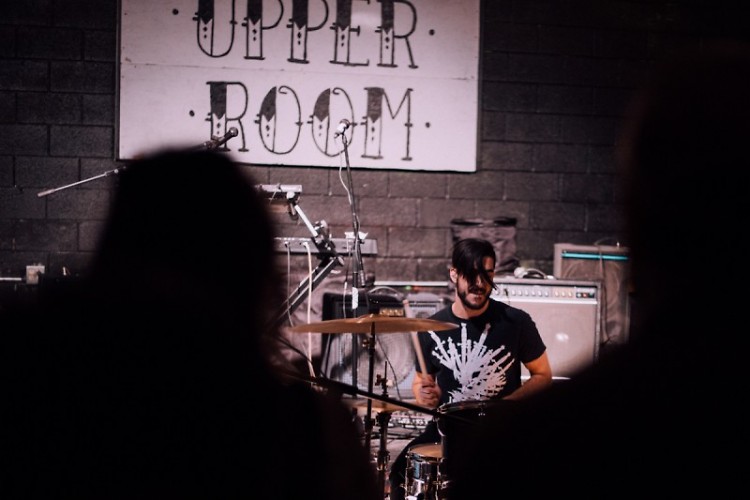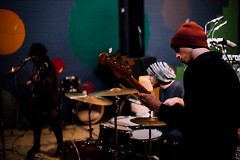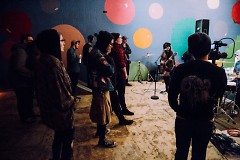By day, people might walk right past Take Hold Church without a second thought. Take Hold Church's brown brick exterior looks the same as any other church, with a Chi-Ro cross being its one distinguishable feature.
But by night, one would stop and listen to the wailing guitars and screams blasting out of the basement.
Take Hold Church is home to the all-ages concert venue known as the Upper Room. Located in the quiet, suburban Garfield Park neighborhood, the Upper Room hosts noisy shows from an eclectic mix of genres and promotes a Do-it-Yourself (DIY) attitude.
The Upper Room consists of a wooden stage, a sound booth decked out in band stickers, and a skate ramp located inside of a former gym. The image of a pepperoni pizza covers the front door, and pink spray paint splashes against the walls.
Shane Cox, the pastor of Take Hold Church and founder of the Upper Room, likes to keep up his punk aesthetic. He keeps a wispy beard, wears only black clothes, and has tattoos running across his neck and knuckles.
Cox leans back in his ancient armchair and lights a votive candle. His office is stripped bare except for a small desk, a short glass bookcase, and a cheeky portrait of St. Paul. A slight draft enters from the room's shattered window, leftover from an attempted break-in on Christmas Eve.
The minimalist, no-frills vibe matches Cox's mission of removing barriers to those who need a space to feel safe and belong.
"I don't want anyone to be forgotten," Cox said.
Filling the void
Cox moved to Michigan in 2006 to attend Grand Rapids Theological Seminary. In between classes on Biblical literature and pastoral care, Cox attended rock shows at a venue called the Mixtape in downtown Grand Rapids.
"I felt a void without music for a while," Cox said. "It got me thinking 'what if I started a new venue? What could it hurt if there were more spaces like the Mixtape?'"
Cox started small, inviting his neighbors to sing and study the Bible at his apartment on Franklin Avenue. As more people showed up, Cox began the search for a permanent space.
Money was tight. To fundraise for the Upper Room's grand opening, Cox passed around an envelope to a handful of friends and received $300. Luckily for Cox, the owner of the Mixtape let Cox rent the space out for a discounted rate of $300.
The Upper Room officially opened in a storefront on Division Avenue in the Heartside Neighborhood in 2009. Word-of-mouth buzz about the venue spread for several years until the summer of 2015 when it hosted15 shows in a single month. The popularity grew despite some concert-goers complaining about the relationship between the Upper Room and Take Hold Church.
"It took a while for people to warm up to going to a punk show connected with a church," Cox said. "The venue is not a funnel for the church. I'm more interested in promoting inclusivity, a place for all ages to create."
Safe haven
Show coordinator Micah Hill used to book almost exclusively punk and metal bands for the Upper Room. These shows attracted hardcore crews, who enjoyed rough-housing in moshpits.
"There's been some crowd surfing," Hill said. "A couple of nose bleeds, black eyes. A few kids getting kicked in the face. Some guy screaming 'Hail Satan!' People know what they're getting into."
Local artist Luke Dean convinced Hill to add indie rock bands and singer-songwriters into the mix. The idea was to welcome all kinds of artists the opportunity, regardless of their background or experience level.
"In DIY venues, you see a lot of bands get hyped, but disappear quickly," Dean said. "It's cool that you might find a band before they make it big."
Instead of choosing a headliner for his bills, Dean mixes touring bands with local bands. An average bill features anywhere between four to eight acts.
Audience members usually come to shows early and stay late, rather than popping in to see a single band. They hang out, skate, and chat about their favorite moments between sets. There is no cut off time, so no one worries about load-in staff booting them out.
"We run on punk time," Dean said. "It feels more like a community than production."
Dean does not mind if shows bring in small crowds of fifteen to fifty people or run at a loss. Turning a profit was never the point of the Upper Room.
"Venues like Pyramid Scheme are great, but they're businesses," Dean said. "We're a safe haven."
Carrying the torch
The Upper Room left the Heartside Neighborhood in 2016. Cox decided it was time for a change when he received noise complaints, and shows outgrew the capacity of a nearby parking lot.
In recent years, four other venues have departed from Division Avenue. The Dirty Hippie and Skelletones shut down, while the Mixtape and the Division Avenue Arts Collective relocated.
Private house shows filled the gap left by the absence of these established venues. Frequent run-ins with the police and the presence of drugs and alcohol often make these spaces unsafe for young artists.
In the meantime, the Upper Room shows no signs of slowing down. Over 750 attendees showed up to see 75 bands play at the latest Take Hold Music Festival.
"Grand Rapid's music scene is hot then cold, but we will keep carrying the torch," Dean said.
The Rapidian, a program of the 501(c)3 nonprofit Community Media Center, relies on the community’s support to help cover the cost of training reporters and publishing content.
We need your help.
If each of our readers and content creators who values this community platform help support its creation and maintenance, The Rapidian can continue to educate and facilitate a conversation around issues for years to come.
Please support The Rapidian and make a contribution today.
Related Articles
Comments, like all content, are held to The Rapidian standards of civility and open identity as outlined in our Terms of Use and Values Statement. We reserve the right to remove any content that does not hold to these standards.


